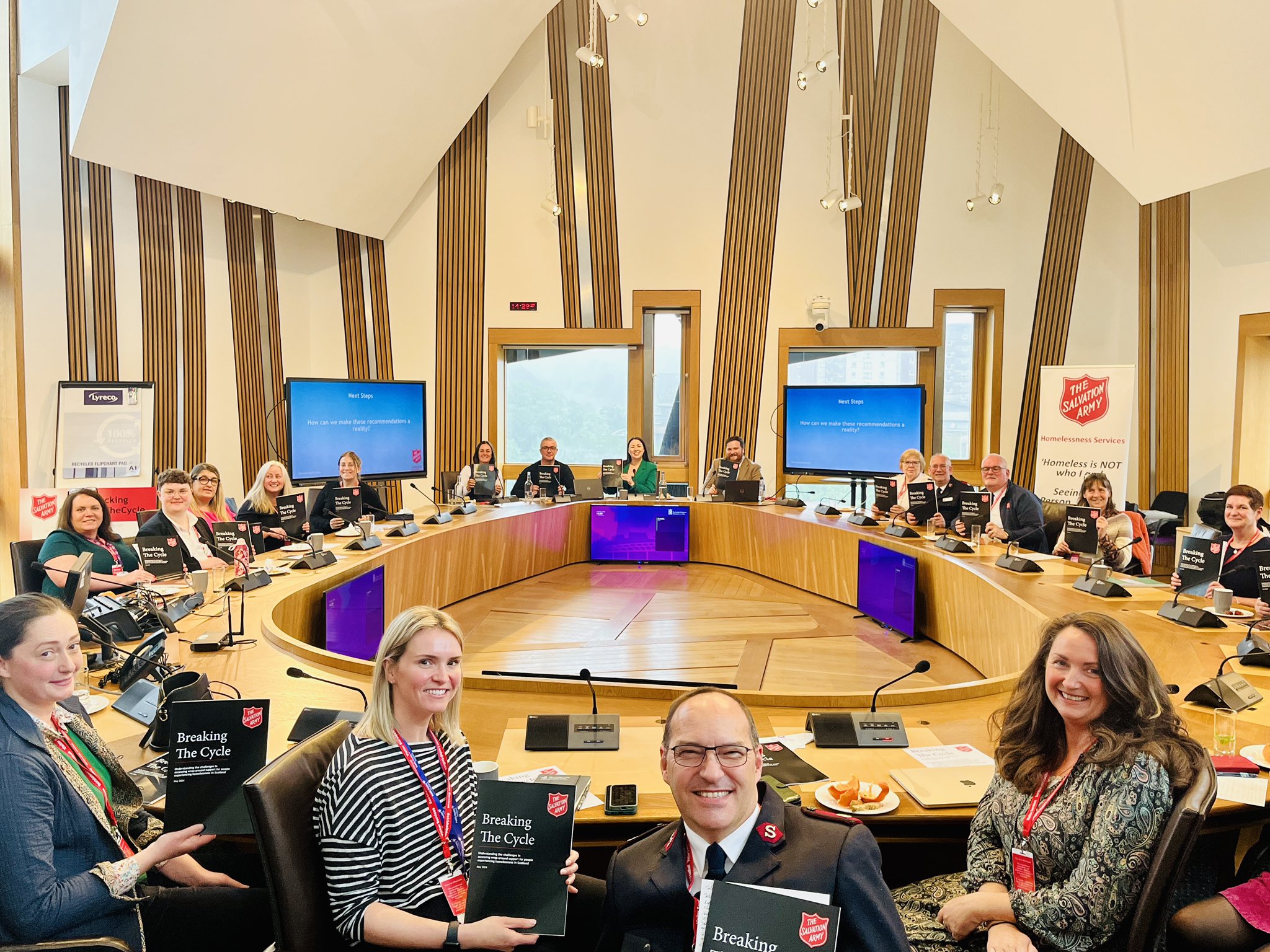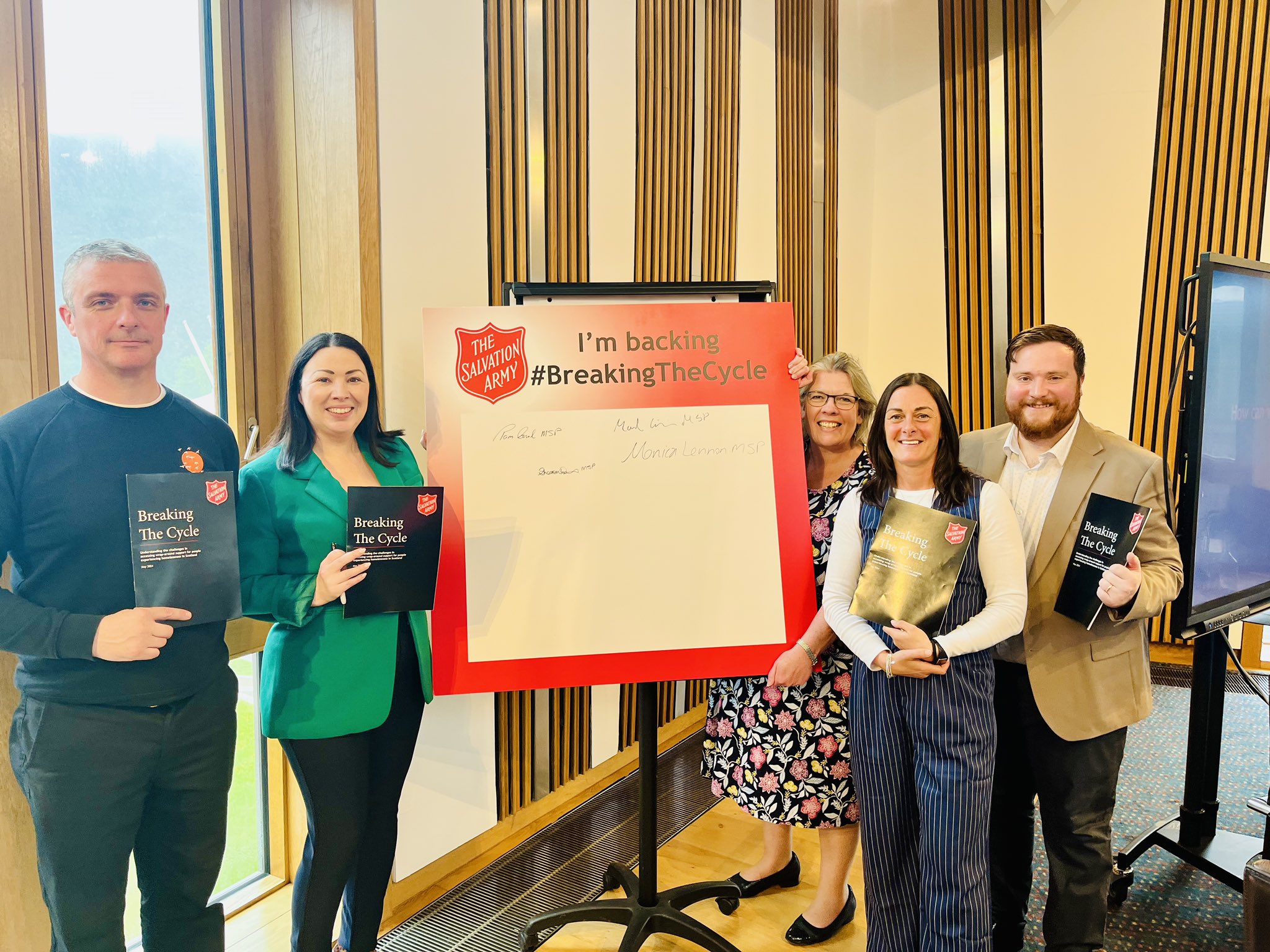New report calls for more data on rough sleeping and homeless deaths
A new report from The Salvation Army in Scotland is recommending urgent collection of data on the number of people rough sleeping, along with cause-of-death data for anyone who dies while living in temporary accommodation.
Launched at the Scottish Parliament yesterday, the Breaking The Cycle report warns that missing data makes it more difficult to effectively plan vital services and guide people into independent living programmes such as Housing First. The makes seven key recommendations to help ensure homelessness is rare, brief and un-repeated.
During the event, Mark Griffin, Scottish Labour’s spokesperson for local government and housing, said he would be keen to work with The Salvation Army to make amendments to the Housing Bill so that two of the relevant recommendations can be included in the legislation.
Research by the church and charity reveals at least 600 people died in temporary accommodation since 2019. However, just one third of Scottish councils record cause-of-death data in those circumstances. Of local authorities that record that information, one-fifth of deaths are drug-related.

The report's launch at the Scottish Parliament
Colonel Sylvia Hinton, secretary for Scotland at The Salvation Army, said: “Every person’s homelessness journey is different. Our new report has found serious gaps in information gathering, which means that services are not always able to respond in a way that ensures people receive the right level of support for their circumstances, helping them to live independently and prevent a return to homelessness. Scotland has some of the strongest policies around homelessness and for these to be effectively implemented and evaluated, reliable and robust data is essential.
“From experience working with people sleeping rough in Scotland and in London we know that resources can be allocated most effectively when we have access to real-time information. There has been no country-wide or cross-council monitoring of rough sleeping in Scotland in recent years. That is why in this report we are calling for a CHAIN-type system similar to the one that operates in London designed to capture the number, nature and distribution of this preventable tragedy. Better data would not only assist in targeting resources it also supports progress towards eradicating rough sleeping and potentially saves lives.”
The recommendations are as follows:
- All local authorities in Scotland to analyse the cause of death of any individual who dies while in temporary accommodation or a Housing First tenancy arranged by a local authority. This information to be promptly reviewed identifying any trends requiring action.
- Government, councils and Health & Social Care Partnerships (HSCPs) to work together to ensure there is drug, alcohol and mental health support available evenings and weekends in all local authority areas.
- Drug and alcohol policy should be treated predominantly as a public health issue.
- Cities and regions with high levels of rough sleeping to introduce a similar recording system of the rough sleeping population as in London (CHAIN)(3).
- People housed in temporary accommodation to be prioritised in receiving specialist support for substance use and mental health.
- People in Housing First tenancies to be prioritised in receiving specialist support for substance use and mental health.
- No individual, especially if they are experiencing homelessness, should be denied mental health support on the basis that they are using drugs or consuming alcohol.
The detailed 30-page document was launched in front of people who have used homelessness services in Scotland and those working in the sector as well as MSPs, leading academics and representatives from Scotland’s charity sector.

Scottish Labour’s MSP for Central Scotland Monica Lennon, who sponsored the event, said the report should serve as a real call to action for the Scottish Government.
She told Scottish Housing News: “This event has heard about the missed opportunities to intervene early and to save lives. It’s tragic that there have been people dying in temporary accommodation and people dying while they’re homeless, so the recommendations are very welcome.
“Scottish Labour has supported today’s launch and wants to work with Salvation Army and partners to implement these recommendations. That could be through amending legislation like the Housing Bill, but there’s other actions that are long overdue because the government have said they would do something and it hasn’t happened. The issue that’s been raised about analysing the cause of death when someone dies, while in temporary accommodation, we’ve heard today that alcohol and drug partnerships had been told to action some of this work a number of years ago, but that hasn’t happened.
“Now we recognise that there are huge funding constraints facing local government and all our public bodies but the buck stops with the Scottish Government. So if John Swinney is sincere about the fresh start he wants to take in listening to not just other MSPs and political parties but partners and stakeholders then this is a report that he should really grab with both hands because it’s full of solutions and part of that is about data gathering and information sharing and genuine partnership working.”
For Scottish Labour’s housing spokesperson Mark Griffin, the recording of data regarding rough sleepers and the cause of death of any individual who dies while in temporary accommodation should be included in the Housing Bill.
He said: “The more we know about rough sleeping, the better placed we are to come up with effective ways to break the cycle of homelessness.
“I welcome the Salvation Army’s work on this critical issue and will explore, with them, whether there are ways to reflect these key recommendations in the current Housing Bill.
“As Scottish Labour has been saying for months, Scotland is in the grips of a housing emergency.
“Now this SNP government has finally accepted this fact, it must put a plan of action in place to ensure all Scots have a place to call home.”









